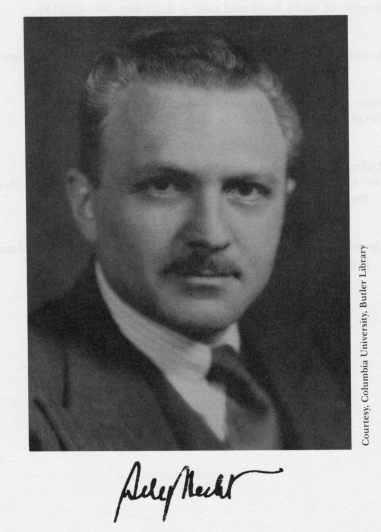Selig Hecht
Selig Hecht

Courtesy, Columbia University, Butler Library
Selig Hecht was an American physiologist who studied photochemistry in photoreceptor cells. Hecht was born in Austria, and immigrated to the United States at an early age. He studied and worked in the United States, England, Germany, and Italy. After broad training in biology, he specialized in the study of the mechanisms of vision. His studies and talents led to him becoming professor of biophysics at Columbia University in 1928.
Hecht began his study into light sensitivity with clams and insects. His specialty was photochemistry, the kinetics of the reactions initiated by light in the receptors. All of his research was interconnected, comparative studies that tried to reach the principles of visual response. His method was quantitative and he was known for having exacting experimental standards. He made contributions to the knowledge of dark adaptation, visual acuity, brightness discrimination, color vision, and the mechanism of the visual threshold. His leading idea was that the very first reactions between light and photo-receptors are bound to determine the characteristics of the visual response. The study of this idea resulted in the establishment of the duplex nature of the mechanisms of the human retina which corresponded to the division of its photo receptors into rods and cones.
In 1941, OSA awarded him with the Frederic Ives Medal, the Society's highest honor.
When World War II ended with the use of atomic weapons which had been developed in secret by the Manhattan Project, Hecht was concerned that the American public was uninformed about the development of this new source of energy. He wrote a book Explaining the Atom (1947), to educate the public. The lack of synthesis in knowledge and teaching perturbed him, and he took an active interest in all the human implications of science. He dealt with persons and ideas on the basis of their intrinsic worth and was always ready to give genuine help.
Hecht died in 1947.
Document Created: 26 July 2023
Last Updated: 24 June 2024
